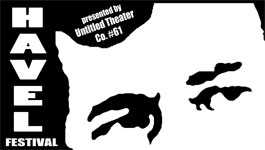|
The Responsibility of a Hero June 11, 2007 Last weekend, Wole Soyinka, the Nobel Prize winning Nigerian playwright and human rights activist, spoke at a national theater conference in Minneapolis. I had been excited to see him on the program-I had heard others refer to him as a Nigerian Václav Havel, and I have been immersed in Havel's life and work ever since my theater company produced the Havel Festival last Fall. Soyinka began his speech by recalling a time, some years ago, when Louis Farrakhan had declared an international "Day of Atonement" and relating that concept to current American politics. In the structure of Soyinka's speech, it was clear that Farrakhan was being viewed as a sort of hero. Soyinka's choice of Farrakhan was puzzling, but at first I attributed it to a sort of tone deafness. Did Soyinka know that Farrakhan, an outspoken anti-Semite notorious for calling Judaism a "gutter religion," had appropriated the Jewish holiday of Yom Kippur (literally the "Day of Atonement") for his Million Man March? Did he know that Farrakhan's Nation of Islam was responsible for selling thousands of copies of the notorious libel, "The Protocols of the Elders of Zion"? As it happens, I had direct experience of the effect of Farrakhan's efforts. About ten years ago, while standing alone on a train platform in Newark, a man had crept up behind me and softly whispered "You made the wrong move, Jew." He then proceeded to explain how Farrakhan and the Nation of Islam had opened his eyes to way Jews controlled the world. Fortunately, a train arrived before any violence could ensue. Soyinka's speech continued with, it seemed to me, rather obvious criticisms of Bush, ranging from race relations to Iraq. Nothing I disagreed with, but nothing that brought anything new to the conversation-nor anything particularly related to theater or Soyinka's own life or experience. He concluded with an imagined worldwide ritual (here, perhaps, something theatrical), imagining what it would be like to fulfill Farrakhan's vision of an international Day of Atonement. Soyinka's imagined, commercialized ritual had little in common with the more sincere, personal ritual seen in any synagogue on what many Jews consider the most holy day of the year. Afterwards, a man in the audience representing a Jewish theater stood up and informed Soyinka of his disappointment with Soyinka's choice of protagonist. To my surprise, Soyinka seemed fully aware of Farrakhan's anti-Semitism, saying only that it had been somewhat toned down and adding "there is more than one victim the world." A very small amount of scattered applause punctuated an awkward silence from the audience, which, as with most American gatherings of theater professionals, had no lack of Jews. I was struck with Soyinka's dismissive tone and the his bullying tactic of mocking the man who had dared to complain, a tactic unfortunately common and familiar through the history of prejudice. I could not help but compare Soyinka's arrogant attitude and speech with Havel's deferential, almost apologetic quests for truth when he speaks. Soyinka was full of confidence and righteousness, Havel full of self-doubt. Soyinka came to a conference of American artists and tried to steer them to what he had determined were the right answers. Havel tries to steer his listeners towards some provocative questions. In some ways, Soyinka's offense was slight. Could a hint of anti-Semitism truly be compared with the good he had done, combating dictatorships within his own country? But it was just because of the mantle that he had assumed, just because of his world acclaim and his Nobel Prize, that his words became so potent. A private citizen can afford to indulge his prejudices. But a world hero needs to root them out. What had Soyinka brought us? Only the sort of radicalism that is, in truth, extraordinarily conservative. His ritual had not been atonement and self-reflection, but repetition by rote of the accepted truths of the left. He exhorted us to remember there was more than one victim, while dismissing the concerns of anyone else but himself and his causes. Soyinka's causes are in themselves laudatory, and I wish him much success in telling the world about them more clearly and convincingly that he was able to in Minneapolis. It is not for nothing that he has been heroized, and one or two slurs do not take away his accomplishments. But in a world that often values conviction over truth, he, like any hero of social justice, has a difficult responsibility. He must be able to take a day, look into his own prejudices, and atone. Edward Einhorn |
||||||||||
Sponsored by:
 |
 |
 |
